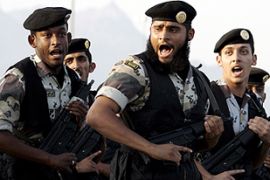|
|
1979 About 250 Saudi militants take over Grand Mosque in Mecca. More than 100 of the fighters and 127 Saudi troops are killed in a two-week siege.
1987 Around 400 people, mainly Iranian Shia pilgrims, are killed in clashes with Saudi security forces during anti-Western protests in Mecca.
1989 One pilgrim is killed and 16 wounded after a bomb explodes near the grand mosque. Saudi Arabia beheads 16 foreigners found guilty of planting the bombs.
1990 A stampede in a tunnel at Mecca causes the deaths of 1426 pilgrims, mostly from Indonesia and Turkey.
1994 A stampede near Jamarat Bridge in Mena kills 270.
1997 A fire kills 343 pilgrims and injures 1500 at camp in Mena.
1998 A stampede near Jamarat Bridge kills 119 when people fall of an underpass.
2001 A stampede near Jamarat Bridge kills 35.
2003 A stampede near Jamarat Bridge kills 14 people when pilgrims going in the opposite directions collide.
2004 A 27-minute stampede near Jamarat Bridge kills at least 251 during the stoning ritual.
2006 A stampede kills 345, the highest number in 16 years, 600 injured.
|
“Saudi Arabia has mobilised all the needed security and municipal forces for a smooth Hajj, so hopefully we will not see any problems,” Prince Nayef bin Abdul Aziz, the interior minister, said on Saturday.
He was speaking after a parade of some of the 50,000 security forces involved in protecting the Hajj.
Nayef said there was no link between this year’s Hajj and the arrest of 208 men last month in the latest of a series of sweeps against suspected fighters.
Ahmadinejad expected
Mahmoud Ahmadinejad, the Iranian president, is expected to perform the Hajj this year after a personal invitation from Saudi Arabia’s King Abdullah.
The invitation is notable as the Iranian leader is an adherent to the Shia sect of Islam, the main faith in Iran, whereas Saudi Arabia is predominantly Sunni.
Tensions between the two main sects of Islam have spilled over into violence in Iraq.
There are also ongoing concerns of repercussions after last week’s deadly suicide bombing in Algeria and the ongoing violence in Iraq and Afghanistan.
Medical precautions
Pilgrims will perform a series of sacred rituals, including walking counter-clockwise seven times around the Kaaba, a cube-shaped structure in Mecca towards which Muslims pray.
Authorities are also hoping to avoid any repeat of the deadly incidents that have hit the Hajj in earlier years.
Last year’s Hajj marked the first time the event was free from tragedy. But in 2006 more than 360 people were killed in a stampede at the entrance to the Jamarat Bridge, where Muslims cast stones at a pillar representing Satan.
A further 70 at least died after a hostel in Mecca housing pilgrims collapsed.
Authorities have deployed 11,000 doctors, nurses and paramedics to provide medical care to pilgrims and 85 ambulances have also been mobilised.
Health alerts will be issued in case of any outbreak of disease, local media reported.
Palestinian pilgrims
In other news, Israel has agreed to let about 900 Gaza pilgrims travel through Israeli territory en route to Saudi Arabia, Palestinian and Israeli officials said on Sunday.
Israeli officials said the passage through the Israeli-controlled Erez crossing was under way at midday, but couldn’t specify how many Gazans had actually crossed.
The Israeli approval was given at the last minute.
